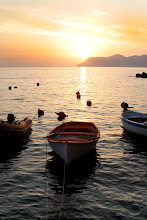We would like to address a question we received from a Red Wine follower that we thought might be helpful for many other followers planning their train journeys abroad.
The question: "The girl with who I will make the inter-rail trip and I have just found out that we need to make a reservation for a lot of national trains. Now, this is a huge bummer because we thought that you could just go anywhere national. It is also a lot harder to plan the journey, but we see it as a challenge. Now is my question for you: how did you book the national and international trains? Which Web site did you use?"
The answer: When we traveled we only needed reservations on night trains and express trains, and we never used the express ones because they were too expensive. Night trains are great because you can get from one town to another and not waste precious daylight. The easiest way to get a reservation takes very little planning.
Most travel groups make a semi-vague or very in-depth list of towns and length of stay in each.
Let's pretend that part of your journey is to Hannover for two days, Berlin for three days and then on a night train to Prague. Most day trains do not need reservations, so just hop on any train as long as it is not an express train and when the conductor comes around, show him your rail pass and all should be fine.
When you arrive in Berlin, go straight to the ticket window and hopefully you have an idea of train times to Prague that you procured either by using the hard copy train timetable Eurail offers or getting one online - OBB (which is sometimes hard to follow but very in-depth – it’s Austrian). You can use this site to download and print PDF timetables from pretty much any city.
www.raileurope.com is very easy and user-friendly, but it doesn’t give all train line advice so I would cross reference with OBB to make sure you’re getting on the correct, reservation-free train.
Ask the ticket agent if the train you want needs a reservation and how much it costs. Most reservations on local non-express trains will cost around $10-15, but can be up to $30 on some longer international or night trains. Now you’ll have a seat on the train and you don’t have to worry about coming back to the station until your train leaves in three days. Or if you find out bad news that all trains are full or reservations cost too much, you have three days in Berlin to decide the next step and perhaps decide to make it to Prague by stopping in smaller towns on the way.
It seems like more and more that express trains are being used, especially the TGV in France and the ICE in Germany. If you look at the PDF Eurail timetable there are eight boxes across: departure time, days the train runs, train line*, transfer stations, transfer times, transfer train line*, and arrival time. There is also a PDF that explains how to read the timetable.
*If in the train line box you see TGV, ICE, THA, ESI, AVI, AVE or anything similar, it means it is an express train and reservations and more money will be needed. The $10-15 will not cover these! These are not covered on the railpass and a separate full price ticket will need to be purchased. Depending on the line, a discount might be offered, but don’t always count on it.
The Eurail timetable only lists a few of the trains and it seems that most of the ones offered in the book are express trains. If you look up on the timetable from Reims – Paris, there are 12 trains that are all TGV. If you go to OBB and check the same for April 21, there are 13 and three (morning, afternoon, evening) are NOT express and will be covered on your railpass. The journey takes an hour longer, but it is well worth not paying the express train fee.
To avoid express trains and reservations, try not to think of your journey as one major city to another. Paris to Berlin, Berlin to Zurich, Zurich to Rome, Rome to Barcelona, etc... It is much easier to use the local regional trains when stopping in places on your way to the larger cities and this also means trains trips are only a few hours at a time instead of long 13-hour trips that can be a little difficult. Avoiding express trains is much easier if you have a month or more to travel. For those with only a week or two, you might need to take some express trains to save time.
I called www.raileurope.com and asked a couple reservation questions and I was told all trains in Spain need a reservation. Italian trains between major cities like Rome, Naples, Venice, Florence and Milan also need reservations. Look at the train number on the OBB Web site. If it is a 9000 number, it will need a reservation. So instead of going straight from Rome to Florence, go from Rome to Perugia and Perugia to Florence with no reservation required. The agent I spoke to basically said it is easiest to ask at the local ticket counter about reservations. You can call Rail Europe and speak with someone to get a better idea, but it seems that every country is different and some countries base reservations on the time of day the train runs. For instance, not all ICE trains in Germany need reservations, but long distance or rush hour ones do.
We know planning train trips can be stressful and it is difficult to get it together. And with the U.S. being a fairly train-free culture (except the very poor Amtrak system), the idea of using only trains as transport in countries that don’t speak English is daunting and scary. You need to come to terms with the fact that you might miss at least one train and a connection or two. It might not hurt to hang out a little longer than required at a train station and people-watch early in your journey; read the departure boards to see if you get the hang of connections, platform locations, arrival and departure times.
Please let us know if you have any more questions. Below is word-for-word page from the Eurail web site and they mention that most regional trains do NOT need reservations.
Do I need reservations?
There are basically three types of trains:
• Trains without reservations: local and regional trains generally require no reservations.
• Trains with optional reservations: you can make a reservation if you want to be assured of a seat, but it is not necessary
• Trains with obligatory reservations: Reservations are required for many high-speed trains such as the Thalys and for overnight trains.
To check if a train requires a reservation, check an online timetable, it will indicate reservation requirements with a 'R' symbol or a sentence like 'Subject to compulsory reservation'. If in doubt, ask at a ticket window at the station before boarding to avoid paying a higher price on the train or even getting a fine.
In the section on Train Reservations you can find an overview of reservation fees and advice on how to make reservations.
Often you can avoid compulsory reservations by taking an alternative (slower) route. See the FAQ How to avoid train reservations.
Monday, 22 March 2010
Subscribe to:
Post Comments (Atom)
















Hi Scott!
ReplyDeleteI just stumbled upon your blog while planning my first backpacking trip to Europe- so excited!
I read a little about the Eurail reservations on the Eurail website a few days ago and got really stressed thinking about it! I'm glad to know that there are trains out there that do not need reservations, but is the only way to find out about them through the OBB?
And what exactly is the OBB? Is it for the rail system throughout Europe? I tried to look for a sample trip and times popped up, but I couldn't find information about prices (or it said call this number for booking info).
Thanks!
Modestine